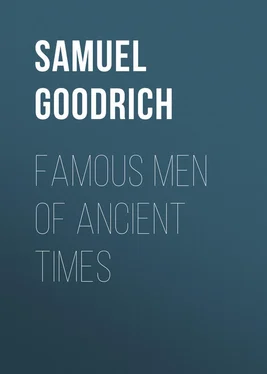Samuel Goodrich - Famous Men of Ancient Times
Здесь есть возможность читать онлайн «Samuel Goodrich - Famous Men of Ancient Times» — ознакомительный отрывок электронной книги совершенно бесплатно, а после прочтения отрывка купить полную версию. В некоторых случаях можно слушать аудио, скачать через торрент в формате fb2 и присутствует краткое содержание. Жанр: foreign_prose, на английском языке. Описание произведения, (предисловие) а так же отзывы посетителей доступны на портале библиотеки ЛибКат.
- Название:Famous Men of Ancient Times
- Автор:
- Жанр:
- Год:неизвестен
- ISBN:нет данных
- Рейтинг книги:5 / 5. Голосов: 1
-
Избранное:Добавить в избранное
- Отзывы:
-
Ваша оценка:
- 100
- 1
- 2
- 3
- 4
- 5
Famous Men of Ancient Times: краткое содержание, описание и аннотация
Предлагаем к чтению аннотацию, описание, краткое содержание или предисловие (зависит от того, что написал сам автор книги «Famous Men of Ancient Times»). Если вы не нашли необходимую информацию о книге — напишите в комментариях, мы постараемся отыскать её.
Famous Men of Ancient Times — читать онлайн ознакомительный отрывок
Ниже представлен текст книги, разбитый по страницам. Система сохранения места последней прочитанной страницы, позволяет с удобством читать онлайн бесплатно книгу «Famous Men of Ancient Times», без необходимости каждый раз заново искать на чём Вы остановились. Поставьте закладку, и сможете в любой момент перейти на страницу, на которой закончили чтение.
Интервал:
Закладка:
The various tribes were each governed by the oldest or most worthy sheik or nobleman. Their bards met once a year, at Okhad, holding a fair of thirty days, for the recitation of their productions. That which was declared to be the finest, was written in gold and suspended in the great temple of Mecca. This was almost the only common tie between the several states or tribes, for, although they nominally acknowledged an emir, or national chief, they had never been brought to act in one body.
The adoration of the Arabians consisted chiefly in the worship of the heavenly luminaries; but they had a great variety of deities, these being personifications of certain powers in nature, or passions in mankind. They were represented by idols of every variety of shape, which were gathered around the ancient temple of Caaba, at Mecca, a large square edifice, considered as the central point of religion, and the favorite seat of divinity. Their worship was attended with the most horrid rites and shocking ceremonies: even children were sacrificed to the idols, and one of the tribes was accustomed to bury their daughters alive. Except that they fancied the souls of the departed to be transformed into owls, hovering in gloom around the grave, it does not appear that they had the least idea of a future state of existence.
Such was the state of religion among the native Arabians. Among the foreign settlers in the towns there were a few followers of the Greek and Roman philosophy; the Christians were never numerous. These latter were divided into a variety of sects, and those belonging to the Greek church, advocated monasteries, and were addicted to the worship of images, martyrs and relics. Some of these, even elevated the Virgin Mary into a deity, and addressed her as the third person in the Trinity.
Mohammed, while he no doubt looked with horror upon this state of things, having studied the Bible, and clearly comprehended its sublime revelation of one God, conceived the idea of uniting the people of his native land under a religion of which this fundamental principle should constitute the basis. His purpose was to crush idolatry, and restore the lost worship of the true God. How far he was sincere, and how far he was an impostor, we cannot venture to affirm. It is probable that he was a religious enthusiast, deceived by his own fancies, and, perhaps, really believing his own visions. At the outset of his career, it is likely that he acted in good faith, while he was himself deluded. When he had advanced so far as to see power and dominion offered to his grasp, it is probable that his integrity gave way, and that thenceforward we are to consider him as under the alternate guidance of craft and fanaticism.
Several of the nobles citizens of Mecca were finally converted by Mohammed. Khadijah was now dead, and the prophet had married Ayesha, the daughter of Abubeker, a man of great influence, and who exercised it in favor of his son-in-law. Yet the new faith made little progress, and a persecution of its votaries arose, which drove them to Abyssinia, and caused Mohammed himself to fly for safety to Medina. This flight is called the Hegira, and, taking place in the year 622, is the epoch from which Mohammedan chronology is computed, as is ours from the birth of Christ.
At Medina, whither his tenets had been carried by pilgrims, Mohammed was received with open arms. He was met by an imposing procession, and invested at once with the regal and sacerdotal office. The people also offered him assistance in propagating his faith, even by force, if it should be required. From this moment, a vast field seems to have been opened to the mind of Mohammed. Hitherto, he may have been but a self-deceived enthusiast; but now, ambition appears to have taken at least partial possession of his bosom. His revelations at once assumed a higher tone. Hitherto he had chiefly inculcated the doctrine of one God, eternal, omnipotent, most powerful and most merciful, together with the practical duties of piety, prayer, charity, and pilgrimages. He now revealed, as a part of his new faith, the duty of making war, even with the sword, to propagate Islamism, and promised a sensual paradise to those who should fall in doing battle in its behalf. At the same time he announced that a settled fate or destiny hung over every individual, which he could not by possibility alter, evade, or avert.
He now raised men, and proceeded, sword in hand, to force the acknowledgment of his pretensions. With alternate victory and defeat, he continued to prosecute his schemes, and at last fell upon the towns and castles of the peaceful and unwarlike Jews. These were soon taken and plundered. But the prophet paid dearly for his triumph. A Jewish female, at the town of Chaibar, gave him poison in some drink, and, though he survived, he never fully recovered from the effects of the dose.
Thus advancing with the tribes settled in his own country, the power of the ambitious apostle increased like the avalanche in its overwhelming descent. Mecca was conquered, and yielded as well to his faith as to his arms. He now made expeditions to Palestine and Syria, while his officers were making conquests in all directions. His power was soon so great, that he sent messages to the kings of Egypt, Persia, and Ethiopia, and the emperor of Constantinople, commanding them to acknowledge the divine law revealed through him.
At last, in the tenth year of the Hegira, he proceeded on a farewell pilgrimage to Mecca. The scene was imposing beyond description. He was attended by more than a hundred thousand of his followers, who paid him the greatest reverence. Everything in dress, equipage and imposing ceremony that could enhance the splendor of the pageant, and give it sanctity in the eyes of the people, was adopted. This was the last great event of his life.
Mohammed had now become too powerful to be resisted by force, but not too exalted to be troubled by competition. His own example in assuming the sacred character of an apostle and prophet, and the brilliant success which had attended him, gave a hint to others of the probable means of advancing themselves to a similar pitch of dignity and dominion. The spirit of emulation, therefore, raised up a fellow-prophet in the person of Moseilama, called to this day by the followers of Islam "the lying Moseilama," a descendant of the tribe of Honeifa, and a principal person in the province of Yemen.
This man headed an embassy sent by his tribe to Mohammed, in the ninth year of the Hegira, and then professed himself a Moslem; but on his return home, pondering on the nature of the new religion and the character and fortunes of its founder, the sacrilegious suggestion occurred to him, that by skilful management he might share with his countryman in the glory of a divine mission; and, accordingly, in the ensuing year he began to put his project in execution. He gave out that he, also, was a prophet sent of Heaven, having a joint commission with Mohammed to recall mankind from idolatry to the worship of the true God. He, moreover, aped his model so closely as to publish written revelations resembling the Koran, pretended to have been derived from the same source.
Having succeeded in gaining a considerable party, from the tribe of Honeifa, he at length began to put himself still more nearly upon a level with the prophet of Medina, and even went so far as to propose to Mohammed a partnership in his spiritual supremacy. His letter commenced thus: "From Moseilama, the apostle of God, to Mohammed, the apostle of God. Now let the earth be half mine and half thine." But the latter, feeling himself too firmly established to stand in need of an associate, deigned to return him only the following reply: "From Mohammed, the apostle of God, to Moseilama, the liar. The earth is God's: he giveth the same for inheritance unto such of his servants as he pleaseth; and the happy issue shall attend those who fear him."
Читать дальшеИнтервал:
Закладка:
Похожие книги на «Famous Men of Ancient Times»
Представляем Вашему вниманию похожие книги на «Famous Men of Ancient Times» списком для выбора. Мы отобрали схожую по названию и смыслу литературу в надежде предоставить читателям больше вариантов отыскать новые, интересные, ещё непрочитанные произведения.
Обсуждение, отзывы о книге «Famous Men of Ancient Times» и просто собственные мнения читателей. Оставьте ваши комментарии, напишите, что Вы думаете о произведении, его смысле или главных героях. Укажите что конкретно понравилось, а что нет, и почему Вы так считаете.












